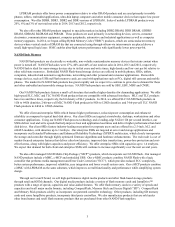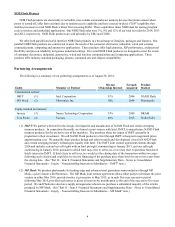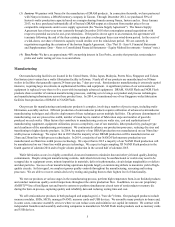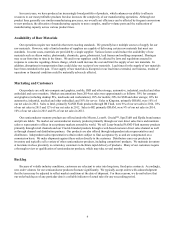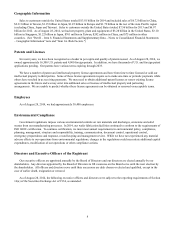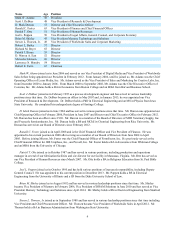Crucial 2014 Annual Report Download - page 15
Download and view the complete annual report
Please find page 15 of the 2014 Crucial annual report below. You can navigate through the pages in the report by either clicking on the pages listed below, or by using the keyword search tool below to find specific information within the annual report.13
We may be unable to generate sufficient cash flows or obtain access to external financing necessary to fund our
operations, make scheduled debt payments and make adequate capital investments.
Our cash flows from operations depend primarily on the volume of semiconductor memory sold, average selling prices and
per unit manufacturing costs. To develop new product and process technologies, support future growth, achieve operating
efficiencies and maintain product quality, we must make significant capital investments in manufacturing technology, capital
equipment, facilities, R&D and product and process technology. We estimate that capital spending for 2015 will be
approximately $3.6 billion to $4.0 billion. In addition, as a result of the MMJ Acquisition, we believe that our future capital
spending will be higher than our historical levels as we integrate our manufacturing operations and support the increase of
capacity resulting from the transaction. As of August 28, 2014, we had cash and equivalents of $4.15 billion, short-term
investments of $384 million and long-term marketable investments of $819 million. Cash and investments included $1.60
billion held by MMJ and its consolidated subsidiaries and $84 million held by IMFT, none of which is generally available to
finance our other operations.
As a result of the corporate reorganization proceedings with the Japan Court under the Corporate Reorganization Act of
Japan (the "Japan Proceedings"), for so long as such proceedings are continuing, the MMJ Companies and their subsidiaries are
subject to certain restrictions on dividends, loans and advances. The plans of reorganization of the MMJ Companies prohibit
the MMJ Companies from paying dividends, including any cash dividends, to us and require that excess earnings be used in
their businesses or to fund the MMJ Companies' installment payments. These prohibitions would also effectively prevent the
subsidiaries of the MMJ Companies from paying cash dividends to us in respect of the shares of such subsidiaries owned by the
MMJ Companies, as any such dividends would have to be first paid to the MMJ Companies which are prohibited from repaying
those amounts to us as dividends under the plans of reorganization. In addition, pursuant to an order of the Japan Court, the
MMJ Companies cannot make loans or advances, other than certain ordinary course advances, to us without the consent of the
Japan Court. Moreover, loans or advances by subsidiaries of the MMJ Companies may be considered outside of the ordinary
course of business and subject to approval of the legal trustees and Japan Court. As a result, the assets of the MMJ Companies
and their subsidiaries, while available to satisfy the MMJ Companies' installment payments and the other obligations, capital
expenditures and other operating needs of the MMJ Companies and their subsidiaries, are not available for use by us in our
other operations. Furthermore, certain uses of the assets of the MMJ Companies, including investments in certain capital
expenditures in MMT, may require consent of MMJ's trustees and/or the Japan Court.
In the past we have utilized external sources of financing when needed. As a result of our current debt levels, expected
debt amortization and general economic conditions, it may be difficult for us to obtain financing on terms acceptable to us.
There can be no assurance that we will be able to generate sufficient cash flows, use cash held by MMJ to fund its capital
expenditures, access capital markets or find other sources of financing to fund our operations, make debt amortization payments
and make adequate capital investments to remain competitive in terms of technology development and cost efficiency. Our
inability to do the foregoing could have a material adverse effect on our business and results of operations.
The acquisition of our ownership interest in Inotera from Qimonda has been challenged by the administrator of the
insolvency proceedings for Qimonda.
On January 20, 2011, Dr. Michael Jaffé, administrator for Qimonda insolvency proceedings, filed suit against MTI and
Micron Semiconductor B.V., our Netherlands subsidiary ("Micron B.V."), in the District Court of Munich, Civil Chamber. The
complaint seeks to void under Section 133 of the German Insolvency Act a share purchase agreement between Micron B.V. and
Qimonda signed in fall 2008 pursuant to which Micron B.V. purchased substantially all of Qimonda's shares of Inotera
Memories, Inc. (the "Inotera Shares"), representing approximately 55% of our total shares in Inotera, and seeks an order
requiring us to retransfer those shares to the Qimonda estate. The complaint also seeks, among other things, to recover
damages for the alleged value of the joint venture relationship with Inotera and to terminate under Sections 103 or 133 of the
German Insolvency Code a patent cross-license between us and Qimonda entered into at the same time as the share purchase
agreement.


